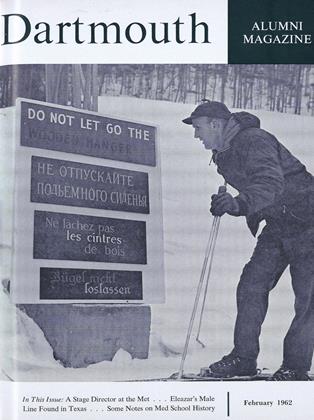DARTMOUTH and one of its young African students will be featured in an hour-long television documentary to be seen in the next few weeks. The show, titled "The Educated African," is one of the award-winning CBS Reports series on Thursday nights. Bill Leonard '37 produced and narrates the show, which takes George Waruhiu '65 from his native Kenya to Dartmouth and depicts his experience en route and at the College.
Latest word from CBS is that the show will be seen some Thursday night between February 15 and March 15. Alumni are advised to check their local TV listings for Thursday night's CBS Reports.
The Psychology Department has moved into its modern new home on Elm Street. Its four-story building, linked to the new Bradley Center for Mathematics by the Filene Auditorium, will have a formal dedication in the spring.
The earlier move of the Mathematics Department to the Bradley Center has freed space in Dartmouth Hall for two of the College's language departments and permitted the transfer of the Russian Civilization Department from Baker Library to Dartmouth Hall. The Departments of German and Romance Languages are now using the former math quarters for seminar rooms, faculty offices, and a teaching-machine room.
An intensive two-week summer course in the use of information theory in science and engineering will be offered by Dartmouth from June 25 to July 6. Dean Myron Tribus of Thayer School and Prof. E. T. Jaynes of Washington University will give the course, which is designed to acquaint engineers, scientists, and business administrators with a new approach to probability and statistical inference originally developed and applied in physics by Professor Jaynes. Dean Tribus has applied the new procedures in engineering. The information theory to be covered in the summer course has important implications for practicing engineers and scientists, because many fields can be treated with a common methodology. The procedures have particular relevance to decision-making and the communication process, and provide answers to some of the problems that have been plaguing probability theorists for 200 years.
 View Full Issue
View Full Issue
More From This Issue
-
 Feature
FeatureThe Very Old and the Old
February 1962 By DR. FREDERIC P. LORD '98 -
 Feature
FeatureStage Director at the Met
February 1962 By RAYMOND J. BUCK '52 -
 Feature
FeatureKenneth Allan Robinson
February 1962 By F. CUDWORTH FLINT -
 Feature
FeatureELEAZAR WHEELOCKS, IN DIRECT LINE, STILL LIVE – IN TEXAS
February 1962 By SEYMOUR E. WHEELOCK '40 -
 Class Notes
Class Notes1950
February 1962 By SCOTT C. OLIN, SIMON J. MORAND III -
 Class Notes
Class Notes1931
February 1962 By WILLARD C. WOLFF, JOHN K. BENSON, JAMES B. GODFREY







